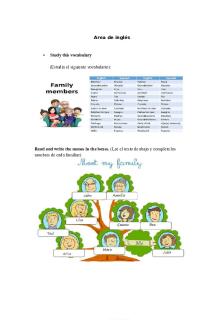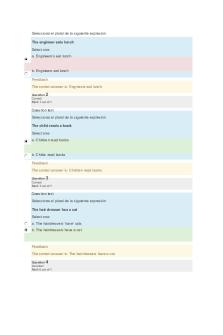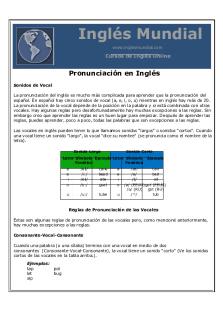Ingles 3 international environments PDF

| Title | Ingles 3 international environments |
|---|---|
| Course | International Environments and Business Operations |
| Institution | Universidad TecMilenio |
| Pages | 3 |
| File Size | 379.6 KB |
| File Type | |
| Total Downloads | 34 |
| Total Views | 158 |
Summary
tarea de ingles que es extra para el proyecto y con calificación alta...
Description
Nombre: María Fernanda Luján Amezcua Nombre del curso: International Environments and Business Operations.
Módulo: 2
Nombre del profesor: Alejandro Lagos Actividad: Assigment 3
Fecha: 05 de marzo de 2022 International Environments and Business Operations.
Assignment 3 Case analysis: NAFTA, trucking and the Mexican economic life.
Matrícula: 2804026
Now answer these four questions: What are the potential economic benefits of the trucking provisions in the NAFTA treaty? Who benefits? Who might lose? Personally I think that one of the benefits of NAFTA and the most important is that Mexican trucks will not need to unload their cargo at the border to change it to a US truck, but rather, that the same truck will be in charge of moving the merchandise from the beginning. . This undoubtedly reduces transportation costs since it eliminates a vehicle for each trip, which will generate an additional profit or a reduction in the final price of the product. However, American truckers could suffer losses, which is why the Teamsters strongly opposed the deal. What do you think motivated the American Teamsters to object the trucking provisions of NAFTA? Are these objections fair? Why did the US Congress initially align itself with the Teamsters? Do you think this was a diplomatic failure for Mexico? As we could see, the Teamsters strongly and rightly opposed the NAFTA provisions that gave Mexican truckers the opportunity to cross US borders and deliver their goods to their final destination. Before NAFTA, Mexican trucks had to refuel their products on US border buses so that the latter would deliver the product to the final destination. Truckers are concerned not only about product losses, but also about the new competition brought by Mexican truckers. The Teamsters will definitely face new competitive challenges with this new layout. Furthermore, if the NAFTA rules are respected, the bloc as a whole will be better off. Did it make sense for the United States to bear the costs of punitive tariffs as allowed for under NAFTA, as opposed to letting Mexican trucks enter the USA? What was the official position adopted by the Mexican government? Was a retaliation the right answer?
I believe that initially Mexico gave the country a second chance to defend the agreement when the United States flatly refused to accept the provisions of NAFTA that were related to trucks. The United States later responded to this by taking bureaucratic measures to block the entry of Mexican vehicles in any way possible. then Mexico reacted by instantly implementing tariff policies for different US goods for Mexico.The new policies faced tariffs of 45% for grape exporters, while other US exporters faced tariffs of 20%. I feel that the response that Mexico gave was completely justified, and that the US measures to protect the Teamsters were very detrimental to another group of Americans, they did not think about the impact they would have on their own people. which is why I feel that the efficiencies of the agreement and the attempts made to protect a single group should also be used by American customers and businesses. Why do you think the Obama administration brokered a deal with Mexico to finally allow Mexican truck drivers to access the United States? As a Mexican citizen, do you find that deal reasonable? I feel that it is an agreement that definitely promotes the export of Mexican goods, but this agreement has several advantages and disadvantages that have a high impact on the industry. The trade in illegal goods such as drugs or similar products that promote violence in our nation would be a very serious consequence if export prices were lowered, thus improving Mexico's economy....
Similar Free PDFs

Micro and Macro Environments
- 4 Pages

Summary Virtual Environments
- 11 Pages

Group Learning Environments
- 5 Pages

Activity 3 ingles - hola
- 6 Pages

Examen ingles 3
- 9 Pages

Quizz 3 - ingles 2
- 1 Pages

Ingles - Apuntes 1-3
- 3 Pages

Ingles 3 examen 1
- 11 Pages

Taller 3 - ingles
- 10 Pages

Actividad 1 ingles 3
- 2 Pages

Ingles 3 Silabo
- 9 Pages

UNIT 3 - INGLES
- 8 Pages
Popular Institutions
- Tinajero National High School - Annex
- Politeknik Caltex Riau
- Yokohama City University
- SGT University
- University of Al-Qadisiyah
- Divine Word College of Vigan
- Techniek College Rotterdam
- Universidade de Santiago
- Universiti Teknologi MARA Cawangan Johor Kampus Pasir Gudang
- Poltekkes Kemenkes Yogyakarta
- Baguio City National High School
- Colegio san marcos
- preparatoria uno
- Centro de Bachillerato Tecnológico Industrial y de Servicios No. 107
- Dalian Maritime University
- Quang Trung Secondary School
- Colegio Tecnológico en Informática
- Corporación Regional de Educación Superior
- Grupo CEDVA
- Dar Al Uloom University
- Centro de Estudios Preuniversitarios de la Universidad Nacional de Ingeniería
- 上智大学
- Aakash International School, Nuna Majara
- San Felipe Neri Catholic School
- Kang Chiao International School - New Taipei City
- Misamis Occidental National High School
- Institución Educativa Escuela Normal Juan Ladrilleros
- Kolehiyo ng Pantukan
- Batanes State College
- Instituto Continental
- Sekolah Menengah Kejuruan Kesehatan Kaltara (Tarakan)
- Colegio de La Inmaculada Concepcion - Cebu



